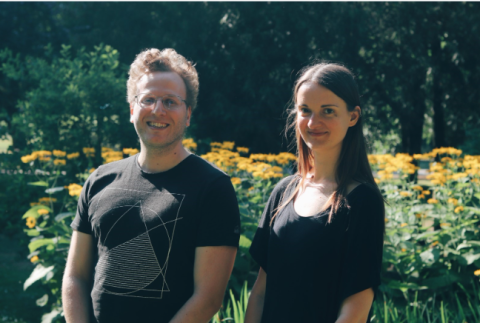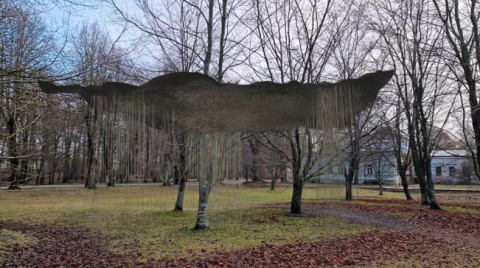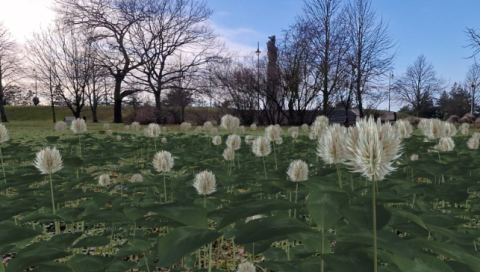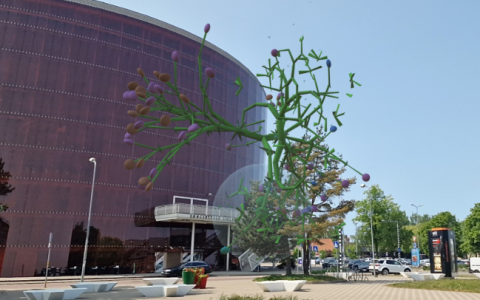In the picturesque town of Liepāja, Latvia, innovation and sustainability are finding an unexpected home nestle along the Baltic Sea.
Here, a remarkable project combining art and agriculture and supported by EIT Community New European Bauhaus (NEB) has taken root. At the heart of this endeavour is Maija, an artist and researcher whose journey into the world of sustainable food cultivation has unearthed novel ways of connecting people with their food and the environment.
Offering a unique blend of artistry and aquaponics – the growing of food and plants in water-based systems – to foster awareness about sustainable food practices, Maija's journey into the world of sustainable food practices is a testament to the power of local action.
Maija is an integral part of a small but active community that focuses on new media arts within a research department of Liepāja University. Her research is far from run of the mill.
'My research delves into multifaceted aspects of food, transcending mere sustenance to encompass mindfulness, meditation, and mental and physical health. It’s also about creating a new relationship with nature, while scrutinising the overarching systems of production that influence our lives,' she says. 'These systems extend to our reliance on the conventional food market, supermarkets, and the perpetual cycle of labouring to acquire goods.'
The striking aspect of Maija's approach is her ability to utilise food as an artistic medium, connecting necessity with sustainability, and beauty with inclusivity. Instead of relying on traditional lectures and discourse to convey vital messages about sustainability and climate change, she uses food as a medium for artistic expression.
'I find this approach makes complex topics more accessible, engaging, and thought-provoking. It invites people to ponder and connect with these issues on a more personal level,' she says.
For Maija, this interplay between food and art is a powerful tool for initiating conversations about pressing global challenges, saying, 'Rather than delivering a straightforward lecture about the mistreatment of animals in the food industry, I might use food as a medium to create an art piece that conveys the same message. This approach often resonates more deeply with audiences and fosters meaningful dialogue.'
Sustainability is a cornerstone of Foodlie's mission, something they see in a broader context. 'Globally, many regions face challenges related to arable land and soil quality,' Maija elaborates. 'Sustainability, in the context of Foodlie, encompasses several critical aspects. Firstly, our aquaponics and hydroponics systems offer a sustainable approach to food production by drastically reducing water consumption. In a world grappling with water scarcity, these systems are remarkably efficient.'
Beyond water conservation, Foodlie envisions sustainability more broadly, with their approach to vertical farming, integrated into apartment blocks and other types of housing, able to help overcome traditional limitations.
These innovations allow food production in areas where traditional agriculture may not always be feasible. Additionally, sustainability pertains to their mission of fostering awareness and education about certain food practices which they hope to bring from the underground to the mainstream. Through their work the organisation aims to raise awareness and inspire communities of people to make more sustainable choices in their day-to-day lives.
Maija’s journey as a quiet pioneer in the world of sustainable food practices took an unexpected turn when she responded to an open funding call with the EIT Community. What she didn’t expect was how her simple project aligned with the New European Bauhaus initiative, an unexpected connection which she says helped bring clarity and coherence to her work. After a successful application to the Connect NEB call, Foodlie found themselves in a position they could hardly imagine even a few months prior.
EIT Community's support was invaluable. Our project received funding totalling EUR 15 000, which allowed us to continue our work organise a series of workshops, masterclasses, and discussions. These events were primarily aimed at engaging with the local community, particularly young adults and children, to educate them about sustainable food practices.
Maija
The three different categories of calls within this work package - Connect, Co-Create and Enhance - further underscore EIT's commitment to supporting impactful initiatives, Marianne goes on to say. 'I encourage all eligible entities, including those from RIS countries, to actively participate and contribute to the realization of these visionary goals.'
Citizen engagement Calls are a pivotal initiative aligning with the transformative vision of the New European Bauhaus, aiming to empower citizens in shaping sustainable, inclusive, and beautiful solutions. As the Programme Manager of these activities from EIT Food’s side, I believe that supporting such projects is paramount in activating citizen-generated initiatives that address pressing challenges in European cities, peri-urban, and rural areas and contribute to building resilient communities.
Marianne Lemberger, EIT Food
Foodlie's vision for the next two to three years is striking in both its ambition and humility, characteristics shared by its founder. 'Our aim is to combine aquaponics and mushroom cultivation within a vertical system designed for apartments in our city. Beyond this, as Latvia is a small country in which a lot of people have homes with large plots of land, we want to help encourage its use for personal food cultivation.'
The goal is to make these systems accessible to a broader audience, empowering individuals to grow their food sustainably, even in urban settings.
When asked about advice for individuals or projects considering applying to EIT Community, Maija is quick to recommend EIT Community as a funding source. She notes that the application process is refreshingly straightforward compared to many other funding opportunities. EIT Community values innovation and offers support that can significantly benefit projects' development. 'It's a great avenue for those working on simple-yet-innovative initiatives to secure the necessary backing and resources.'
Maija's path from the world of art to aquaponics, and her subsequent collaboration with EIT Community, underscores the transformative potential of interdisciplinary innovation. Foodlie's multifaceted fusion is not only refreshing but offers a pragmatic solution to some of the world's most pressing challenges, such as water scarcity and the need for more sustainable production methods.
As they continue to inspire and engage their community, Maija and Foodlie serve as a beacon of hope, proving that creativity and sustainability can go hand in hand. They remind us that the path to a more sustainable future could be a delicious, shared experience, nurturing our relationship with food and the environment one bite at a time.






 Share this page
Share this page


